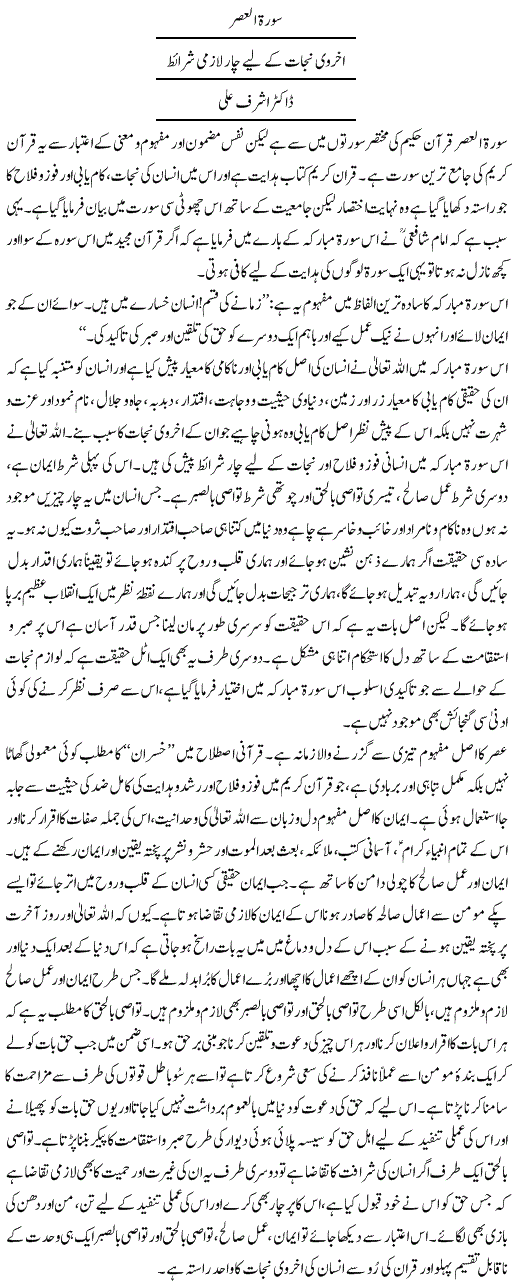
Surah Al-Asr: Akhrat Ki Nijaat Kay Liay Char Lazmi Sharait
Do Not Be Fooled By The One Who Recites
The Prophet (PBUH) has said: Malik said, “I heard that al-Qasim ibn Muhammad used to say, ‘I have seen the people, (i.e. the companions), and they were not impressed by speech.’ ” Malik said, “He meant that only action and deed would be looked at, not words.” [Malik’s Muwatta, Book #56, Hadith #56.10.25)
‘Umar bin Al-Khattaab said: “Do not be fooled by the one who recites the Qur’an for that is only words we utter. Rather, look at the one who acts upon it.”
Al-Hasan said: “Verily, this Qur’an is learned by servants and young children who do not approach it from its front side, nor do they have knowledge of the interpretation of its meanings. Allah, the Most High, says: ‘This is a Book (which) We have sent down to you, full of blessings, that they may ponder over its verses.’ [Soorah Saad: 29] What does pondering over its verses mean? It means following it through actions. And verily, the people with the most right to this Qur’an are those who follow it even if they don’t recite it. One of them says: ‘O so and so, come here, I will teach you how to recite! When did the reciters ever do this? They are not the reciters, nor are they the forbearing, nor the wise. May Allah not increase their likes amongst the people!”
Bakr bin Khunais said: “Verily, in the Hellfire there is a valley, which the Hellfire seeks refuge from seven times every day. And verily, in this valley there is a pit, which the valley and the Hellfire seek refuge from seven times every day. And verily, in this pit, there is a snake, which the pit, the valley, and the Hellfire seek refuge from seven times every day. It will begin first with the wicked bearers of the Qur’an. So they will say: ‘O Lord! Will you start with (punishing) us before the idol worshippers? It will be said to them: ‘The one who knows is not like the one who doesn’t know.’”
Allah Ta’ala Kay Azab Say Bay Khof Na Hua Jaye

Allah Ta’ala Kay Azab Say Bay Khof Na Hua Jaye
Wise Sayings From Hadith And Sunnah
1) Narrated `Ali (RA): The Prophet (PBUH) said, “Do not tell a lie against me for whoever tells a lie against me (intentionally) then he will surely enter the Hell−fire.” [Bukhari 1/106]
2) Narrated Abu Huraira(RA): The Prophet(PBUH) said, “Religion is very easy and whoever overburdens himself in his religion will not be able to continue in that way. So you should not be extremists, but try to be near to perfection and receive the good tidings that you will be rewarded; and gain strength by worshipping in the mornings, the nights.” [Bukhari 1/38]
3) Narrated Al−Mughira(RA): The Prophet (PBUH) said, “Allah has forbidden you
(1) to be undutiful to your mothers
(2) to withhold (what you should give) or
(3) demand (what you do not deserve), and
(4) to bury your daughters alive. And Allah has disliked that
(A) you talk too much about others
(B), ask too many questions (in religion), or
(C) waste your property.”
[Bukhari 8/6]
4) “He who does not thank people does not thank Allah.” Hadith – Tirmidhi 1877, Saheeh: Related by and at-Tirmidhee (no. 1877) and Aboo Daawood (no. 4177). It was declared authentic by Imam al-Albaanee in as-Saheehah (no. 417)
5) Narrated `Adi bin Hatim heard the Prophet(PBUH) saying: “Save yourself from Hell−fire even by giving half a date fruit in charity.” [Bukhari 2/498]
6) Narrated Abu Huraira(RA): The Prophet(PBUH) said, “Whoever established prayers on the night of Qadr out of sincere faith and hoping for a reward from Allah, then all his previous sins will be forgiven; and whoever fasts in the month of Ramadan out of sincere faith, and hoping for a reward from Allah, then all his previous sins will be forgiven.” [Bukhari 3/125]
7) Narrated Abu Huraira(RA): The Prophet(PBUH) said, “Whoever believes in Allah and the Last Day should not hurt (trouble) his neighbor. And I advise you to take care of the women, for they are created from a rib and the most crooked portion of the rib is its upper part; if you try to straighten it, it will break, and if you leave it, it will remain crooked, so I urge you to take care of the women.” [Bukhari 7/114]
8) Narrated Abu Huraira(RA): Allah’s Apostle(PBUH) said, “Anybody who believes in Allah and the Last Day should not harm his neighbor, and anybody who believes in Allah and the Last Day should entertain his guest generously and anybody who believes in Allah and the Last Day should talk what is good or keep quiet. (i.e. abstain from all kinds of evil and dirty talk). [Bukhari 8/47]
9) Abu Huraira(RA) reported Allah’s Messenger (may peace be upon him)as saying: The world is a prison−house for a believer and Paradise for a non−believer. [Muslim 42/7058]
10) Abu Huraira(RA) reported Allah’s Messenger(PBUH) said: There is a bone in the human being which the earth would never consume and it is from this that new bodies would be reconstituted (on the Day of Resurrection). They said: Allah’s Messenger, which bone is that? Thereupon he said: It is the spinal bone. [Muslim 41/705]
11) The son of Abu Said al−Khudri reported on the authority of his father that Allah’s Messenger (may peace be upon him) said: When one of you yawns, he should keep his mouth shut with the help of his hand, for it is the devil that enters therein. [Muslim 42/710]
Zaban Ki Afat

Zaban Ki Afat by Muhammad Tahir-ul-Qadri
Purifying Ourselves, Physically And Spiritually
WUDU is a pre-condition for Salah. It shows Islam’s stress on purifying ourselves, physically and spiritually.
Prophet Muhammad (peace be upon him) said about the virtue of Wudhu: “When a slave makes ablution and rinses his mouth, his wrong deeds fall from it. As he rinses his nose, his wrong deeds fall from it. When he washes his face, his wrong deeds fall from it until they fall beneath his eyelashes. When he washes his hands, his wrong deeds fall from them until they fall from beneath his fingernails. When he wipes his head, his wrong deeds fall from it until they fall from his ears. When he washes his feet, his wrong deeds fall from them until they fall from beneath his toenails. Then his walking to the mosque and his prayer fetch him an extra reward.” (Malik, An-Nasa’i, Ibn Majah and Al-Hakim)
After we complete our Wudhu, one of the Du’as our Prophet (peace be upon him) taught us to say is: “Ash-hadhu An Laa ilaaha illAllahu wahdahu Laa Shareeka Lahu wa Ash-hadu Anna Muhammadan Abduhu wa Rasuluhu” (I bear witness that none has the right to be worshipped except Allah, alone, without any partner, and I bear witness that Muhammad is His slave and Messenger).
Sheikh Salih Al-Fowzan explained: “The reason behind reciting Dhikr and invocation following ablution is to combine both physical and spiritual purity.
Ablution is a means of attaining physical purity, whereas Dhikr and invocation (implying declaring monotheism and repentance for sins) are signs of spiritual purity.
In this way, one gets into the perfect state of purity (combining both physical and spiritual purity) and becomes pure enough to be admitted to stand before Allah in prayer, imploring Him humbly and submissively. (Mulakhkhas Al-Fiqh, Eng. version, vol. 1, ch. 7, p. 43)
Baat Baat Par Kasmein Uthane Waley Naseehat Hasil Kerin

Baat Baat Par Kasmein Uthane Waley Naseehat Hasil Kerin
Hazrat Abu Huraira (Radi Allah Anhu)
[Sahih Bukhari: Volume 1, Book 3, Number 118] Narrated Abu Huraira (Radi Allah Anhu): People say that I have narrated many Hadiths (The Prophet’s (sal-allahu- alleihi-wasallam ) narrations). Had it not been for two verses in the Qur’an, I would not have narrated a single Hadith, and the verses are: “Verily those who conceal the clear sign and the guidance which We have sent down . . . (up to) Most Merciful.” (2:159-160). And no doubt our Muhajir (emigrant) brothers used to be busy in the market with their business (bargains) and our Ansari brothers used to be busy with their property (agriculture). But I (Abu Huraira) used to stick to Allah’s Apostle (sal-allahu- alleihi-wasallam ) contented with what will fill my stomach and I used to attend that which they used not to attend and I used to memorize that which they used not to memorize.
[Sahih Bukhari: Volume 1, Book 3, Number 119] Narrated Abu Huraira (Radi Allah Anhu): I said to Allah’s Apostle (sal-allahu- alleihi-wasallam ) “I hear many narrations (Hadiths) from you but I forget them.” Allah’s Apostle (sal-allahu- alleihi-wasallam ) said, “Spread your Rida’ (garment).” I did accordingly and then He moved his hands as if filling them with something (and emptied them in my Rida’) and then said, “Take and wrap this sheet over your body.” I did it and after that, I never forgot anything.
[Sahih Bukhari: Volume 1, Book 3, Number 121] Narrated Abu Huraira (Radi Allah Anhu): I have memorized two kinds of knowledge from Allah’s Apostle (sal-allahu- alleihi-wasallam ). I have propagated one of them to you and if I propagated the second, then my pharynx (throat) would be cut (i.e. killed).
Fard, Muashra Aur Akhlaq e Nabvi

Fard, Muashra Aur Akhlaq e Nabvi
On The Day Of Judgement Every One WIll Be Paid Full Of Recompense
[ALLAH’S Quran – 3:185] “Every soul shall have a taste of death: And only on the Day of Judgment shall you be paid your full recompense. Only he who is saved far from the Fire and admitted to the Garden will have attained the object (of Life): For the life of this world is but goods and chattels of deception.”
The Prophet (peace be upon him) has said : [Bukhari, Book #76, Hadith#470] “Narrated Abu Huraira: Allah’s Apostle said, “the deeds of anyone of you will not save you (from the (Hell)fire).” they said, “Even you (will not be saved by your deeds), O Allah’s Apostle?” He said, “No, even I (will not be saved) unless and until Allah bestows His Mercy on me. therefore, do good deeds properly, sincerely and moderately, and worship Allah in the forenoon and in the afternoon and during a part of the night, and always adopt a middle, moderate, regular course whereby you will reach your target (Paradise).

